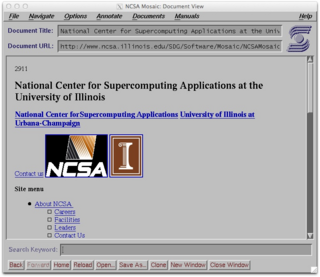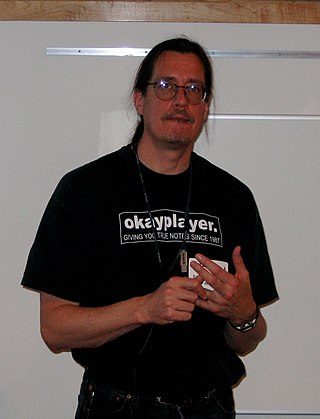Related Research Articles
The Gopher protocol is a communication protocol designed for distributing, searching, and retrieving documents in Internet Protocol networks. The design of the Gopher protocol and user interface is menu-driven, and presented an alternative to the World Wide Web in its early stages, but ultimately fell into disfavor, yielding to Hypertext Transfer Protocol (HTTP). The Gopher ecosystem is often regarded as the effective predecessor of the World Wide Web.

The World Wide Web is an information system that enables content sharing over the Internet through user-friendly ways meant to appeal to users beyond IT specialists and hobbyists. It allows documents and other web resources to be accessed over the Internet according to specific rules of the Hypertext Transfer Protocol (HTTP).

A website is a collection of web pages and related content that is identified by a common domain name and published on at least one web server. Websites are typically dedicated to a particular topic or purpose, such as news, education, commerce, entertainment, or social media. Hyperlinking between web pages guides the navigation of the site, which often starts with a home page. The most-visited sites are Google, YouTube, and Facebook.
Wide Area Information Server (WAIS) is a client–server text searching system that uses the ANSI Standard Z39.50 Information Retrieval Service Definition and Protocol Specifications for Library Applications" (Z39.50:1988) to search index databases on remote computers. It was developed in 1990 as a project of Thinking Machines, Apple Computer, Dow Jones, and KPMG Peat Marwick.

NCSA Mosaic was among the first widely available web browsers, instrumental in popularizing the World Wide Web and the general Internet by integrating multimedia such as text and graphics. Mosaic was the first browser to display images inline with text.

Cello is an early, discontinued graphical web browser for Windows 3.1; it was developed by Thomas R. Bruce of the Legal Information Institute at Cornell Law School. It was released as shareware in 1993. While other browsers ran on various Unix machines, Cello was the first web browser for Microsoft Windows, using the winsock system to access the Internet. In addition to the basic Windows, Cello worked on Windows NT 3.5 and with small modifications on OS/2.
The File Transfer Protocol (FTP) is a standard communication protocol used for the transfer of computer files from a server to a client on a computer network. FTP is built on a client–server model architecture using separate control and data connections between the client and the server. FTP users may authenticate themselves with a plain-text sign-in protocol, normally in the form of a username and password, but can connect anonymously if the server is configured to allow it. For secure transmission that protects the username and password, and encrypts the content, FTP is often secured with SSL/TLS (FTPS) or replaced with SSH File Transfer Protocol (SFTP).

Archie is a tool for indexing FTP archives, allowing users to more easily identify specific files. It is considered the first Internet search engine. The original implementation was written in 1990 by Alan Emtage, then a postgraduate student at McGill University in Montreal, Canada. Archie was superseded by other, more sophisticated search engines, including Jughead and Veronica, which were search engines for the Gopher protocol. These were in turn superseded by search engines like Yahoo! in 1995 and Google in 1998. Work on Archie ceased in the late 1990s. A legacy Archie server was maintained for historic purposes in Poland at Interdisciplinary Centre for Mathematical and Computational Modelling in the University of Warsaw until 2023.
An application layer is an abstraction layer that specifies the shared communication protocols and interface methods used by hosts in a communications network. An application layer abstraction is specified in both the Internet Protocol Suite (TCP/IP) and the OSI model. Although both models use the same term for their respective highest-level layer, the detailed definitions and purposes are different.
This page provides an index of articles thought to be Internet or Web related topics.
Jughead is a search engine system for the Gopher protocol. It is distinct from Veronica in that it searches a single server at a time.

Alan Emtage is a Bajan-Canadian computer scientist who conceived and implemented the first version of Archie, a pre-Web Internet search engine for locating material in public FTP archives. It is widely considered the world's first Internet search engine.

Mark Perry McCahill is an American computer scientist and Internet pioneer. He has developed and popularized a number of Internet technologies since the late 1980s, including the Gopher protocol, Uniform Resource Locators (URLs), and POPmail.
HyTelnet was an early attempt to create a universal or at least simpler interface for the various Telnet-based information resources available before the World Wide Web. It was first developed in 1990 by Peter Scott, then at the University of Saskatchewan in Saskatoon, Canada. Using a client written by Earl Fogel, HyTelnet offered its users a primitive terminal-based GUI that allowed them to browse a directory of Telnet-based resources and then access them in a relatively standardized manner. On-line help was available, and there were frequent updates made available to its database which sites could download.

A search engine is a software system that provides hyperlinks to web pages and other relevant information on the Web in response to a user's query. The user inputs a query within a web browser or a mobile app, and the search results are often a list of hyperlinks, accompanied by textual summaries and images. Users also have the option of limiting the search to a specific type of results, such as images, videos, or news.

The World Wide Web is a global information medium that users can access via computers connected to the Internet. The term is often mistakenly used as a synonym for the Internet, but the Web is a service that operates over the Internet, just as email and Usenet do. The history of the Internet and the history of hypertext date back significantly further than that of the World Wide Web.

Windows Search is a content index and desktop search platform by Microsoft introduced in Windows Vista as a replacement for the previous Indexing Service of Windows 2000, Windows XP, and Windows Server 2003, designed to facilitate local and remote queries for files and non-file items in the Windows Shell and in compatible applications. It was developed after the postponement of WinFS and introduced to Windows several benefits of that platform.
The Internet Hunt was a monthly online game and search training tool, conceived and conducted by Rick Gates, as Director of Library Automation UC Santa Barbara, which began 31 August 1992, before the World Wide Web.
Agora was a World Wide Web email browser and was a proof of concept to help people to use the full internet. Agora was an email-based web browser designed for non-graphic terminals and to help people without full access to the internet such as in developing countries or without a permanent internet connection. Similar to W3Gate, Agora was a server application designed to fetch HTML documents through e-mail rather than http.
The following outline is provided as an overview of and topical guide to search engines.
References
- ↑ "Navigating the Internet - Penn Printout, Feb 1993". upenn.edu. Archived from the original on August 22, 2018.
- 1 2 Doctorow, Cory (2020-02-21). "Gopher: When Adversarial Interoperability Burrowed Under the Gatekeepers' Fortresses". Electronic Frontier Foundation . Archived from the original on 2020-02-21. Retrieved 2024-07-21.
- ↑ Lee, Christopher (Cal) (1999-04-23). "Where Have all the Gophers Gone? Why the Web beat Gopher in the Battle for Protocol Mind Share". ils.unc.edu. Archived from the original on 2007-06-07. Retrieved 2024-07-21.
- ↑ Smith, Ernie (2017-08-01). "Long Live Gopher: The Techies Keeping the Text-Driven Internet Alive". Vice. Archived from the original on 2020-10-19. Retrieved 2024-07-20.
- ↑ "Veronica FAQ (Part 1 of 2)". www.ou.edu. Q11. Archived from the original on 1999-01-16. Retrieved 2024-07-21.
- ↑ Museum, Web Design (10 March 2023). "Veronica search engine - 1992 | Web Design Museum". www.webdesignmuseum.org.
- ↑ Cory Doctorow, at about 12:37 Cory states in his podcast what Veronica stands for.